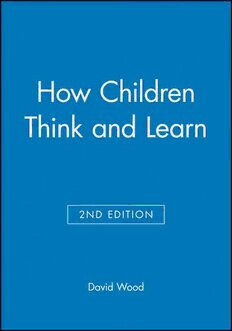
How Children Think and Learn PDF
Preview How Children Think and Learn
How Children Think and Learn The Social Contexts of Cognitive Development SECOND EDITION David Wood Éjk Blackwell \§ß Publishing This page intentionally left blank How Children Think and Learn Second Edition Understanding Children's Worlds Series Editor: Judy Dunn The study of children's development can have a profound influence on how children are brought up, cared for and educated. Many psychologists argue that, even if our knowledge is incomplete, we have a responsibility to attempt to help those concerned with the care, education and study of children by making what we know available to them. The central aim of this series is to encourage developmental psychologists to set out the findings and the implications of their research for others - teachers, doctors, social workers, students and fellow researchers - whose work involves the care, education and study of young children and their families. The information and the ideas that have grown from recent research form an important resource which should be available to them. This series provides an opportunity for psychologists to present their work in a way that is interesting, intelligible and substantial, and to discuss what its consequences may be for those who care for, and teach children: not to offer simple prescriptive advice to other professionals, but to make important and innovative research accessible to them. Children doing Mathematics Terezhina Nunes and Peter Bryant Children and Emotion Paul L. Harris Bullying at School Dan Olweus How Children Think and Learn, 2nd edition David Wood Making Decisions about Children, 2" edition H. Rudolph Schaffer Children's Talk in Communities and Classrooms Lynne Vernon-Feagans Children and Political Violence Ed Cairns The Work of the Imagination Paul Harris Changing Families Jan Pryor and Bryan Rodgers How Children Think and Learn The Social Contexts of Cognitive Development SECOND EDITION David Wood Éjk Blackwell \§ß Publishing © 1988, 1998 by David Wood BLACKWELL PUBLISHING 350 Main Street, Maiden, MA 02148-5020, USA 9600 Garsington Road, Oxford OX4 2DQ, UK 550 Swanston Street, Carlton, Victoria 3053, Australia The right of David Wood to be identified as the Author of this Work has been asserted in accordance with the UK Copyright, Designs, and Patents Act 1988. All rights reserved. No part of this publication may be reproduced, stored in a retrieval system, or transmitted, in any form or by any means, electronic, mechanical, photocopying, recording or otherwise, except as permitted by the UK Copyright, Designs, and Patents Act 1988, without the prior permission of the publisher. First published 1988 Second Edition 1998 23 2010 Library of Congress Catcdoging-in-Publication Data Wood, David J. How children think and learn : the social contexts of cognitive development/David Wood.—2nd ed. p. cm.—(Understanding children's worlds) Includes bibliographical references and index. ISBN 978-0-631-20007-9 (pbk. : alk. paper) 1. Cognition in children. 2. Learning, Psychology of. I. Title. II. Series. BF723.C5W66 1998 155.4'13-dc21 97-22303 CIP A catalogue record for this title is available from the British Library. Set in 10 on 12 pt Sabon by Ace Filmsetting Ltd, Frome, Somerset Printed and bound in Singapore by Markono Print Media Pte Ltd The publisher's policy is to use permanent paper from mills that operate a sustainable forestry policy, and which has been manufactured from pulp processed using acid-free and elementary chlorine-free practices. Furthermore, the publisher ensures that the text paper and cover board used have met acceptable environmental accreditation standards. For further information on Blackwell Publishing, visit our website: www.blackwellpublishing.com I dedicate this book, with greetings and gratitude, to Jerome S. Bruner This page intentionally left blank Contents Series editor's preface xi Preface to the second edition xii Acknowledgements xiv Introduction: From Pavlov to Piaget... a round trip? 1 Changing perspectives on learning and development 2 Learning and instruction 8 Uncertainty and information 11 1 Images of childhood and their reflection in teaching 15 Learning and schooling 15 From five to eleven 18 Thought as internalized action 21 Piaget's approach to language and cognition 24 Vygotsky: instruction and intelligence 26 Piaget and Vygotsky on talking and thinking 27 Processing information: on becoming an expert 31 Piaget, Vygotsky and Bruner: a brief comparison and summary 37 2 A decade of development (maturation and learning!) 40 The impact of Vygotskian thinking 40 Neo-Piagetian theory 43 Information processing: mental models and expertise 44 Mental modules and maturation 45 Time to synthesize? 49
